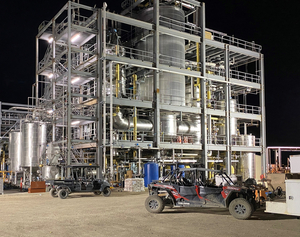SPOTLIGHT: Building with Balance

PHOTO: BDI-BIOENERGY INTERNATIONAL GMBH
June 10, 2021
BY Tom Bryan
For over 25 years, Austria-based BDI-BioEnergy International GmbH has been engineering biodiesel plants globally, building a name for its industry-leading design and deep understanding of feedstocks and pretreatment systems. Today, the company’s renowned process savvy is being applied to the fast-growing renewable diesel segment while, at the same time, BDI is staying busy with new biodiesel plant construction.
“Working with all kinds of different feedstock throughout the years, from fresh vegetable oils to waste oils and fats, we have gained considerable know-how and an unmatched understanding of how to process them to biodiesel,” says Theo Friedrich, technical sales manager for BDI. “It was a logical next step for us to use that knowledge and experience gained in biodiesel to expand our activities in the field of pretreatment for renewable diesel.”
Now, with multiple biodiesel projects underway—and renewable diesel activity rising precipitously around the world—BDI is balancing its resources to serve both segments of the biomass-based diesel industry. “Waste-based biodiesel is still the most important sector for us, and we are working on several large biodiesel projects at the moment,” Friedrich says. “For sure, the field of renewable diesel is growing, and it is an important sector that fits very well into our portfolio as a supplier of renewable fuel technology and green tech solutions.”
Currently, BDI’s multi-feedstock biodiesel technology, called RepCAT, is being installed at Cargill’s high-profile biodiesel plant under construction in Ghent, Belgium. The facility will be the first in Europe capable of processing numerous feedstocks, including fatty acids from vegetable oil refining, liquid residues from industrial processes, and even the fat recovered from sewage sludge from local municipalities.
The Ghent facility will be complete in June 2022. For BDI, however, the work won’t stop with commissioning. “For us, the customer service that comes after startup is an important task,” Friedrich says. “It is our mission to train and hand over to our customers the important knowledge regarding the efficient and economic operation of the plant.”
Advertisement
Advertisement
Related Stories
The U.S. Energy Information Administration maintained its forecast for 2025 and 2026 biodiesel, renewable diesel and sustainable aviation fuel (SAF) production in its latest Short-Term Energy Outlook, released July 8.
XCF Global Inc. on July 10 shared its strategic plan to invest close to $1 billion in developing a network of SAF production facilities, expanding its U.S. footprint, and advancing its international growth strategy.
U.S. fuel ethanol capacity fell slightly in April, while biodiesel and renewable diesel capacity held steady, according to data released by the U.S. EIA on June 30. Feedstock consumption was down when compared to the previous month.
XCF Global Inc. on July 8 provided a production update on its flagship New Rise Reno facility, underscoring that the plant has successfully produced SAF, renewable diesel, and renewable naphtha during its initial ramp-up.
The U.S. EPA on July 8 hosted virtual public hearing to gather input on the agency’s recently released proposed rule to set 2026 and 2027 RFS RVOs. Members of the biofuel industry were among those to offer testimony during the event.
Upcoming Events










